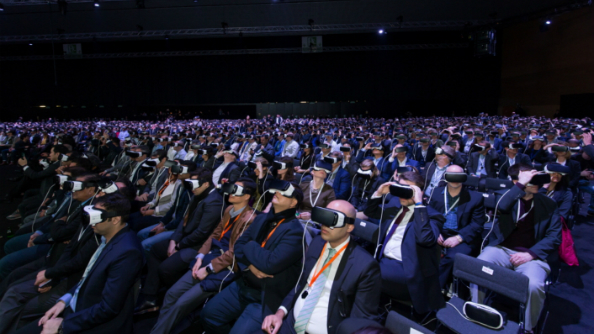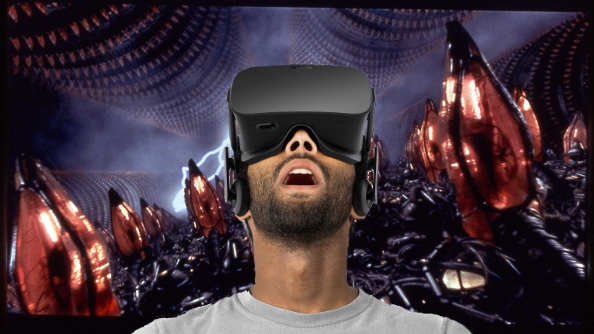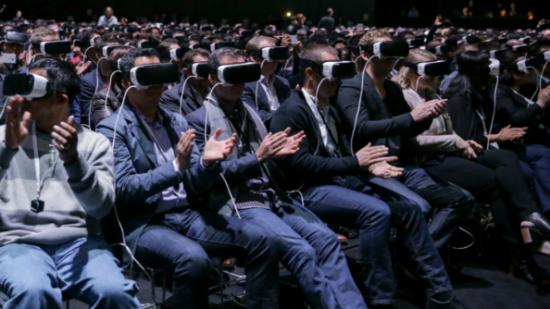You think that’s air you’re breathing? Elon Musk doesn’t. At this year’s Code conference, the PayPal co-founder and Tesla boss told a room of bemused tech industry influencers that the chances we’re not already living in a computer simulation are “one in billions”.
It’s not a new idea – philosophers from René Descartes to Nick Bostrom to have been swilling it around before the Wachowskis even put pen to paper on the Matrix. What was striking about Musk’s comments, however is just how vehemently he delivered them. Elon Musk; tech billionaire; A man who has a significant say in our shared direction as a species, strongly believes we’re living in a simulation.
Read more: play these PC sandbox games and forget the notion that you might live inside one.
If the guy next to you on the bus tells you “If you assume any rate of improvement at all, then the games will become indistinguishable from reality, just indistinguishable,” you give him a polite smile. If the founder and CEO of SpaceX, Tesla Motors, co-chairman of OpenAI, co-founder of PayPal and 83rd richest person in the world says it, you pay attention.
So: is Musk right?
I was fortunate enough to speak to Demis Hassabis recently. The DeepMind artificial general intelligence agent he developed with Shane Legg and Mustafa Suleyman learned the vastly complex game of Go well enough to beat an eighteen-time world champion player and attracted a $500 million purchase from Google. It’s a hugely advanced AI that warrants its own ethics board, and stands a real chance of solving scientific and medical problems that have had us stumped for centuries. If Musk’s predictions are on the money, one would assume Hassabis and his work are instrumental in bringing it to fruition. Who better to assess its validity?
“We actually talked about it together,” he tells me. “I would say, he’s got that idea from Nick Bostrom who’s written about this idea and is a famous philosopher from Oxford. He’s the person who’s come up with this simulation hypothesis, which in itself is really a version of the ‘brain in a jar’, Matrix-type philosophy that’s been around for a very long time. So it’s not really new.
“Clearly we have to update our probabilities based on how photorealistic games seem to be getting. I think it’s quite obvious that we’re going to get to very realistic pretty soon in the next 20 years or so on. Maybe then you won’t be able to tell anymore.”

That might be true, although it’s worth noting that games are also taking on increasingly stylised aesthetics as they’re increasing in fidelity – The Witcher 3 looks great, for example, but it’s not trying to look like reality. But does the path of increased fidelity lead to an imperceptible simulation?
“I still struggle with a lot of the assumptions underlying these hypotheses,” says Hassabis. “Why would future generations bother building high-fidelity copies of the past? I’m not sure.
“I can imagine a few reasons why that might be. I’m not really sure I buy the hypothesis in the form that Nick Bostrom suggested and Elon was commenting on. Having said that I am interested in a physicist’s point of view in the nature of reality and the fabric of reality – what’s really going on here, the age old questions of the purpose of the universe and the structure of the universe.
“This is ‘base reality’ as they call it, but that doesn’t mean that you couldn’t think usefully about this being a computational world. Everything seems to be strangely, classically computable that we’ve seen so far in the universe. And then there are interesting things that we haven’t explained like, quantum mechanics… interesting things that make you think about what might be going on.”

Another element of the debate is the nature of consciousness. Thus far, we haven’t even reached an agreement on what consciousness is, so we’re a long way away from simulating it.
“It’s still not properly defined even yet,” Hassabis continues, “even in philosophy.”
“Even in neuroscience there’s not an agreed definition of it. Clearly it must involve some things like self-awareness, a sense of identity, and I’ve heard descriptions about consciousness that make sense to me like ‘the way that information feels when it gets processed.’
“There are these interesting descriptive ideas about consciousness, but I don’t think there’s been anything substantial as a theory I would say, a grounded, scientific theory yet. We’re pretty agnostic about what consciousness actually is.
“I actually think that by building AI, especially in the neuroscientific way that we’re trying to do, and then comparing its capabilities to the human mind, I think that might be the best path to explore these questions of consciousness and seeing the unique qualities that the human mind has. Once you solve that it might help with the question about what’s actually going on here.”
